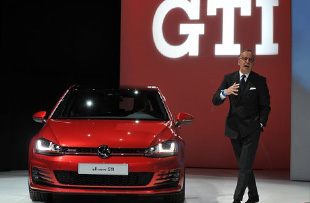
GUANGZHOU/BEIJING -- Chinese fashion label Exception is leading an unexpected surge in interest in domestic fashion brands after Peng Liyuan was spotted wearing the label during a four-nation state visit with President Xi Jinping, also her husband.
Footage of Peng stepping off a plane wearing a double-breasted black coat and carrying a leather handbag quickly went viral online, with Peng winning praise for her elegance and fashion sense.
"Her handbag will become a hot item!" said "shishangbozhu-YY" on Sina Weibo, China's major microblogging service.
"Domestic brands are on the road! The Chinese dream is on the road!" said "Chenjiangningv" on Sina Weibo.
Fashion bloggers soon identified Peng's outfit as the work of Guangzhou-based Exception.
Established in 1996 by a couple who shared a love of design, Exception now has nearly 100 retail stores nationwide. Its success has largely relied on its inexpensive prices and close connection to Chinese consumers.
Soon after Peng was photographed wearing the label, Exception spokeswoman Tan Jiayi said the company received multiple interview requests and the company's website crashed due to heavy online traffic.
The company also said many VIP clients have asked whether Exception still sells the clothes worn by Peng. The Exception store in Chengdu has sold out of handbags similar to the one carried by Peng.
Domestic brands face hurdle
The high-profile display of confidence in domestic fashion is a contrast to China's normal passion for foreign luxury brands.
Despite being the world's greatest consumers of luxury goods, Chinese have rarely been big fans of their own brands.
In Hong Kong, Macao, London and Paris, Chinese shoppers can be seen in force at Louis Vuitton, Hermes and Gucci stores.
Luxury cars have also flourished in the Chinese market. British automaker Bentley Motors said last week it sold a quarter of its production last year in China.
Increasingly affluent Chinese surpassed US consumers to become the world's top spenders on luxury products last year. However, about 60 percent of their purchases were made overseas, according to a report released by the consulting firm Bain & Co.
After decades of rapid economic growth, China has seen some of its local brands enter Western markets. For example, telecom manufacturer Huawei and computer giant Lenovo have gotten a foothold overseas.
However, most Chinese brands remain virtually unknown to foreign consumers. Meanwhile, many Chinese are obsessed with foreign luxury brands, especially when it comes to fashion.
The lack of competitive brands has harmed Chinese entrepreneurs and also pushed the government to support indigenous brands.
For example, the government is considering purchasing fewer foreign vehicles for use by government officials. Last March, the Ministry of Industry and Information Technology released a draft catalog of car models for government procurement that included only domestic names.
Government pressure is starting to have an effect. The Hongqi H7, a luxury car model manufactured by the China FAW Group Corporation, has been ordered by more than 10 provincial governments and some ministries, company president Xu Xianping said earlier this month.
However, Chinese enterprises still have a long way to go in forging powerful brands, said Xu Haoran, deputy chairman of the China Association of Small and Medium Enterprises.
Boost to local fashion industry
Industry insiders are celebrating the recent attention paid to Exception, hoping it will create good fortune for the budding fashion industry.
Angelica Cheung, editorial director of Vogue China, said the buzz will create new opportunities for Chinese labels that are competing with Western counterparts.
On Monday, the clothing and textile sector of China's stock market saw a 0.5-percent rise, bucking an overall downward trend, and over half the stocks in the sector rose, with three climbing by the 10-percent daily limit.
Peng's impact has been described as similar to the "Kate Middleton effect," a term coined after Duchess of Cambridge Kate Middleton brought attention to British fashion brand Issa after wearing one of its blue gowns to announce her engagement.
"Peng's attire is likely to kick off a domestic-brand boom," said "ShaoliBryant" on Sina Weibo.
Official figures indicate that China's garment industry earned 1.51 trillion yuan ($243.4 billion) last year, up 11.2 percent year on year.
However, challenges have surfaced as the fashion industry matures.
Cheung said the amount Chinese companies spend on branding is low compared to foreign brands.
"Domestic companies are encountering fierce competition. Higher standards should be introduced and promoted," Cheung said.
Cheung noted, however, that Chinese designers have started gaining global recognition as well as attention from home consumers, who have more "confidence and understanding" regarding domestic brands.
Su Baoyan, acting president of the China Fashion Association, said China's fashion industry has a lack of high-level designers.
"Good designers are not only creative, but also able to take control of the entire process from production to marketing," Su said.
In a commentary published on Tuesday, the Beijing News called for developing premium-quality domestic products rather than seeking profits through volume.
The trend that Peng has sparked might lead to the public paying more attention to Chinese clothing brands, giving such labels a rare opportunity, the Beijing-based newspaper said.
 'Cat model' to dazzle Shanghai auto show 2013
'Cat model' to dazzle Shanghai auto show 2013
 Models at Tokyo modified car show
Models at Tokyo modified car show
 Shanghai Fashion Week focuses on domestic brands
Shanghai Fashion Week focuses on domestic brands
 Angel-dress models at Shandong auto show
Angel-dress models at Shandong auto show
 Safe and Sound
Safe and Sound
 Theater firms scramble for managers
Theater firms scramble for managers
 Premier pledges closer ties with Brunei
Premier pledges closer ties with Brunei
 Volkswagen's all-new GTI at New York auto show
Volkswagen's all-new GTI at New York auto show